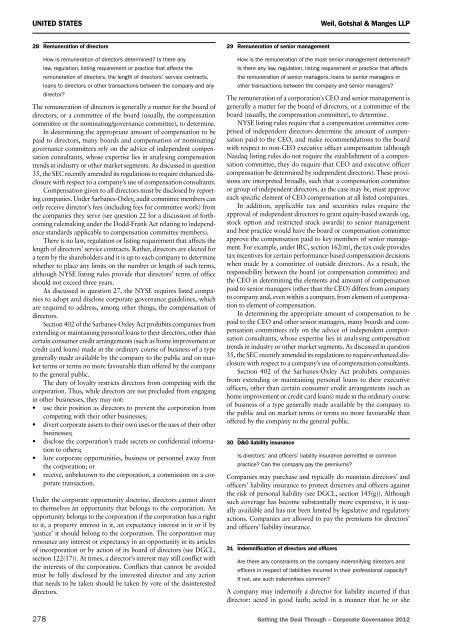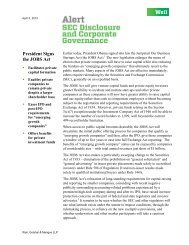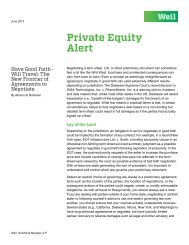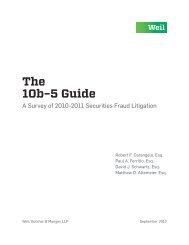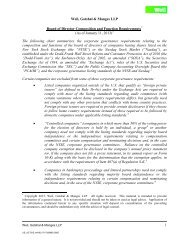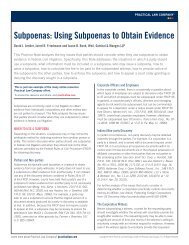Corporate Governance - Weil, Gotshal & Manges
Corporate Governance - Weil, Gotshal & Manges
Corporate Governance - Weil, Gotshal & Manges
You also want an ePaper? Increase the reach of your titles
YUMPU automatically turns print PDFs into web optimized ePapers that Google loves.
United States<br />
<strong>Weil</strong>, <strong>Gotshal</strong> & <strong>Manges</strong> LLP<br />
28 Remuneration of directors<br />
How is remuneration of directors determined Is there any<br />
law, regulation, listing requirement or practice that affects the<br />
remuneration of directors, the length of directors’ service contracts,<br />
loans to directors or other transactions between the company and any<br />
director<br />
The remuneration of directors is generally a matter for the board of<br />
directors, or a committee of the board (usually, the compensation<br />
committee or the nominating/governance committee), to determine.<br />
In determining the appropriate amount of compensation to be<br />
paid to directors, many boards and compensation or nominating/<br />
governance committees rely on the advice of independent compensation<br />
consultants, whose expertise lies in analysing compensation<br />
trends in industry or other market segments. As discussed in question<br />
35, the SEC recently amended its regulations to require enhanced disclosure<br />
with respect to a company’s use of compensation consultants.<br />
Compensation given to all directors must be disclosed by reporting<br />
companies. Under Sarbanes-Oxley, audit committee members can<br />
only receive director’s fees (including fees for committee work) from<br />
the companies they serve (see question 22 for a discussion of forthcoming<br />
rulemaking under the Dodd-Frank Act relating to independence<br />
standards applicable to compensation committee members).<br />
There is no law, regulation or listing requirement that affects the<br />
length of directors’ service contracts. Rather, directors are elected for<br />
a term by the shareholders and it is up to each company to determine<br />
whether to place any limits on the number or length of such terms,<br />
although NYSE listing rules provide that directors’ terms of office<br />
should not exceed three years.<br />
As discussed in question 27, the NYSE requires listed companies<br />
to adopt and disclose corporate governance guidelines, which<br />
are required to address, among other things, the compensation of<br />
directors.<br />
Section 402 of the Sarbanes-Oxley Act prohibits companies from<br />
extending or maintaining personal loans to their directors, other than<br />
certain consumer credit arrangements (such as home improvement or<br />
credit card loans) made in the ordinary course of business of a type<br />
generally made available by the company to the public and on market<br />
terms or terms no more favourable than offered by the company<br />
to the general public.<br />
The duty of loyalty restricts directors from competing with the<br />
corporation. Thus, while directors are not precluded from engaging<br />
in other businesses, they may not:<br />
• use their position as directors to prevent the corporation from<br />
competing with their other businesses;<br />
• divert corporate assets to their own uses or the uses of their other<br />
businesses;<br />
• disclose the corporation’s trade secrets or confidential information<br />
to others;<br />
• lure corporate opportunities, business or personnel away from<br />
the corporation; or<br />
• receive, unbeknown to the corporation, a commission on a corporate<br />
transaction.<br />
Under the corporate opportunity doctrine, directors cannot divert<br />
to themselves an opportunity that belongs to the corporation. An<br />
opportunity belongs to the corporation if the corporation has a right<br />
to it, a property interest in it, an expectancy interest in it or if by<br />
‘justice’ it should belong to the corporation. The corporation may<br />
renounce any interest or expectancy in an opportunity in its articles<br />
of incorporation or by action of its board of directors (see DGCL,<br />
section 122(17)). At times, a director’s interest may still conflict with<br />
the interests of the corporation. Conflicts that cannot be avoided<br />
must be fully disclosed by the interested director and any action<br />
that needs to be taken should be taken by vote of the disinterested<br />
directors.<br />
29 Remuneration of senior management<br />
How is the remuneration of the most senior management determined<br />
Is there any law, regulation, listing requirement or practice that affects<br />
the remuneration of senior managers, loans to senior managers or<br />
other transactions between the company and senior managers<br />
The remuneration of a corporation’s CEO and senior management is<br />
generally a matter for the board of directors, or a committee of the<br />
board (usually, the compensation committee), to determine.<br />
NYSE listing rules require that a compensation committee comprised<br />
of independent directors determine the amount of compensation<br />
paid to the CEO, and make recommendations to the board<br />
with respect to non-CEO executive officer compensation (although<br />
Nasdaq listing rules do not require the establishment of a compensation<br />
committee, they do require that CEO and executive officer<br />
compensation be determined by independent directors). These provisions<br />
are interpreted broadly, such that a compensation committee<br />
or group of independent directors, as the case may be, must approve<br />
each specific element of CEO compensation at all listed companies.<br />
In addition, applicable tax and securities rules require the<br />
approval of independent directors to grant equity-based awards (eg,<br />
stock option and restricted stock awards) to senior management<br />
and best practice would have the board or compensation committee<br />
approve the compensation paid to key members of senior management.<br />
For example, under IRC, section 162(m), the tax code provides<br />
tax incentives for certain performance-based compensation decisions<br />
when made by a committee of outside directors. As a result, the<br />
responsibility between the board (or compensation committee) and<br />
the CEO in determining the elements and amount of compensation<br />
paid to senior managers (other than the CEO) differs from company<br />
to company and, even within a company, from element of compensation<br />
to element of compensation.<br />
In determining the appropriate amount of compensation to be<br />
paid to the CEO and other senior managers, many boards and compensation<br />
committees rely on the advice of independent compensation<br />
consultants, whose expertise lies in analysing compensation<br />
trends in industry or other market segments. As discussed in question<br />
35, the SEC recently amended its regulations to require enhanced disclosure<br />
with respect to a company’s use of compensation consultants.<br />
Section 402 of the Sarbanes-Oxley Act prohibits companies<br />
from extending or maintaining personal loans to their executive<br />
officers, other than certain consumer credit arrangements (such as<br />
home improvement or credit card loans) made in the ordinary course<br />
of business of a type generally made available by the company to<br />
the public and on market terms or terms no more favourable than<br />
offered by the company to the general public.<br />
30 D&O liability insurance<br />
Is directors’ and officers’ liability insurance permitted or common<br />
practice Can the company pay the premiums<br />
Companies may purchase and typically do maintain directors’ and<br />
officers’ liability insurance to protect directors and officers against<br />
the risk of personal liability (see DGCL, section 145(g)). Although<br />
such coverage has become substantially more expensive, it is usually<br />
available and has not been limited by legislative and regulatory<br />
actions. Companies are allowed to pay the premiums for directors’<br />
and officers’ liability insurance.<br />
31 Indemnification of directors and officers<br />
Are there any constraints on the company indemnifying directors and<br />
officers in respect of liabilities incurred in their professional capacity<br />
If not, are such indemnities common<br />
A company may indemnify a director for liability incurred if that<br />
director: acted in good faith; acted in a manner that he or she<br />
278 Getting the Deal Through – <strong>Corporate</strong> <strong>Governance</strong> 2012


